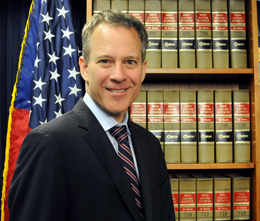 Energy Plus overcharged New Yorkers on energy costs, despite promising savings; many New Yorkers ultimately paid hundreds more per year; Schneiderman’s ongoing investigation into ESCOs has returned $5 million to New Yorkers, offers tips to protect public from unscrupulous ESCOs
Energy Plus overcharged New Yorkers on energy costs, despite promising savings; many New Yorkers ultimately paid hundreds more per year; Schneiderman’s ongoing investigation into ESCOs has returned $5 million to New Yorkers, offers tips to protect public from unscrupulous ESCOs
As part of a wider investigation into energy service companies, Attorney General Eric Schneiderman today announced an $800,000 settlement with Energy Plus Holdings LLC and Energy Plus Natural Gas LLC (collectively, “Energy Plus”). An investigation found that the company lured consumers with false promises of savings, and then fleeced them with much higher bills; failed to disclose material terms such as conditions for receiving cash back; and implied that cancellations could be processed immediately. A total of $800,000 will be available in refunds for eligible consumers as part of the settlement that also imposes new restrictions on Energy Plus’s marketing practices to prevent future frauds.
“Thousands of New Yorkers were lured by Energy Plus’s false promises of savings, only to be stuck with more expensive energy bills. Our settlement means we’ll be able to refund consumers who were illegally scammed by this company,” Schneiderman said. “Energy service companies should be put on notice: we won’t allow them to exploit New Yorkers looking to save on their energy bills.”
New Yorkers who bought electricity or natural gas from Energy Plus after Oct. 15, 2012, may be eligible for a refund if they were subject to certain deceptive practices. New Yorkers can submit a complaint online at https://forms.ag.ny.gov/CIS/
The Attorney General’s ongoing investigation into energy service companies has returned more than $5 million to consumers, including nearly $2 million to customers of Columbia Utilities Power LLC and more than $1 million to customers of HIKO Energy, LLC.
Energy service companies purchase energy on the open market and then sell it to consumers. Utilities still deliver the energy to consumers, but consumers can choose to purchase their energy directly from the utility or through an ESCO. Energy Plus used its status as an ESCO to charge its customers much higher prices than they would have paid if they purchased energy from their utilities. In many instances, consumers who received services from Energy Plus ultimately paid hundreds more per year than they would have with their local utility company.
The Attorney General’s investigation found that Energy Plus’s direct mailings and email advertisements falsely promised competitive energy rates. Additionally, Energy Plus telemarketers promised consumers that they would benefit from Energy Plus’s “market-based” rates. Customers who enrolled were then hit with rates that were frequently much higher than those offered by their local utilities. Beginning in 2012, Energy Plus ceased many of its deceptive practices regarding rate claims. In 2013, Energy Plus settled a class action suit based, in part, on Energy Plus’s representations that consumers would pay less with Energy Plus than with their utilities, and issued $1.1 million in refunds. However, Energy Plus continued to engage in other deceptive practices, including failing to adequately disclose that its rates might be higher than the utilities’ rates and failing to disclose that cancellations could take months to process and could result in early termination fees.
The settlement between the Attorney General’s office and Energy Plus requires that Energy Plus pay $800,000 to the Attorney General’s office to use as restitution for consumers, as well as pay penalties and fees once the restitution process is complete. The settlement also requires Energy Plus to take measures to prevent deceptive practices in the future, including adequate training of customer service representatives, refraining from misleading advertising that implies savings, regular monitoring of customer service calls, and appropriate disciplinary procedures for violations of the law.
Consumers can protect themselves from unscrupulous ESCOs by remembering the following tips:
- If you receive an offer for energy services, make sure you understand whether the offer is from your utility or an ESCO.
- You do not have to choose an ESCO to supply your gas or electricity. You may choose to use your utility as your direct supplier.
- Make sure you understand whether an ESCO contract involves an early termination fee and, if so, the fee amount and the length of your contract commitment.
- Before accepting any offer, ask the ESCO to show you how its rates have compared with your utility’s rates during each month in the past year. This can help you judge how competitive the ESCO’s rates may be in the future.
- Remember that you have the right to cancel an ESCO contract with no obligation within three days if you change your mind.
- If you are uncomfortable with how a marketer behaves, end the conversation with a request to look over their offer in writing so you can get back to them when you have made a decision free of any pressure.
- If you receive a notice that your service is being switched to an ESCO and you did not authorize the switch, contact the utility and the ESCO immediately to tell them to halt the switch. If you are unable to get an ESCO switch canceled, contact the New York Public Service Commission at 1-888-697-7728.
The Energy Plus investigation was handled by Assistant Attorney General Kate Matuschak under the supervision of Deputy Bureau Chief Laura J. Levine and Bureau Chief Jane Azia, all of the Consumer Frauds and Protection Bureau, and under the supervision of Executive Deputy Attorney General for Economic Justice Manisha M. Sheth.

